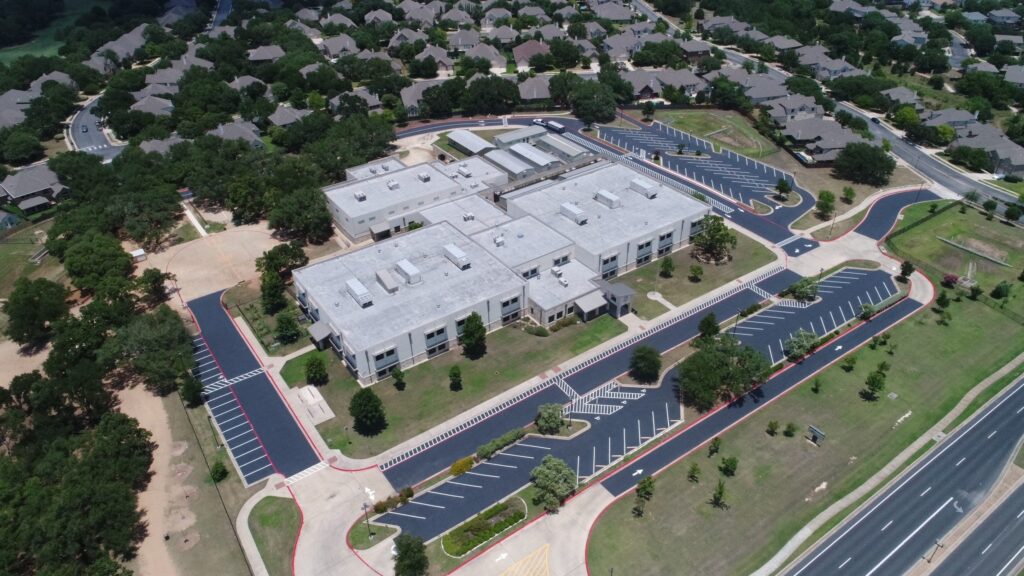 Seal coating is one of the most effective tools you can use to prolong the life of your asphalt pavement. It should be part of your routine asphalt maintenance program, which should include filling potholes and cracks as soon as they appear and reapplying sealcoating to the entire paved surface every two to five years. Seal coating not only makes your asphalt surface look newer and more attractive, but it also protects against a variety of things that can shorten the life of your asphalt.
Seal coating is one of the most effective tools you can use to prolong the life of your asphalt pavement. It should be part of your routine asphalt maintenance program, which should include filling potholes and cracks as soon as they appear and reapplying sealcoating to the entire paved surface every two to five years. Seal coating not only makes your asphalt surface look newer and more attractive, but it also protects against a variety of things that can shorten the life of your asphalt.
• Sun: UV rays can “weather” your asphalt in a similar fashion to the damages that can be done to human skin that is subjected to excessive exposure to the sun. Your asphalt can lose its moisture content and become brittle. The pavement no longer has the ability to “bounce back,” leading to cracks and potholes.
• Oxidation: The binders used in asphalt productions (and to an extent, asphalt itself) can break down merely from being exposed to oxygen. Seal coating slows the oxidation process to help guard against premature deterioration.
• Chemicals: Virtually all of the fluids and chemicals used in modern vehicles can damage asphalt. Oil, gasoline and brake fluid, for example, soften asphalt and can make it easy for normal traffic to dislodge chunks of pavement. Potholes and cracks can form, leading to further damage. Sealcoating acts as a barrier between chemicals and the asphalt.
• Weather: The freeze/thaw cycle can cause severe damage to asphalt pavement, especially if water has penetrated beneath the surface. Ice and snow will melt more quickly on a sealcoated surface, reducing the risk that water will find its way beneath the pavement.Seal coating is also a cost-effective way to make your asphalt pavement look more attractive. Although it cannot repair cracks or major damage, seal coating will fill in minor “dings” and imperfections to give a smooth, even appearance. It will also restore color to faded asphalt to give it a warm, dark look that is very similar to new pavement.
• Oxidation: The binders used in asphalt productions (and to an extent, asphalt itself) can break down merely from being exposed to oxygen. Seal coating slows the oxidation process to help guard against premature deterioration.
• Chemicals: Virtually all of the fluids and chemicals used in modern vehicles can damage asphalt. Oil, gasoline and brake fluid, for example, soften asphalt and can make it easy for normal traffic to dislodge chunks of pavement. Potholes and cracks can form, leading to further damage. Sealcoating acts as a barrier between chemicals and the asphalt.
• Weather: The freeze/thaw cycle can cause severe damage to asphalt pavement, especially if water has penetrated beneath the surface. Ice and snow will melt more quickly on a sealcoated surface, reducing the risk that water will find its way beneath the pavement.Seal coating is also a cost-effective way to make your asphalt pavement look more attractive. Although it cannot repair cracks or major damage, seal coating will fill in minor “dings” and imperfections to give a smooth, even appearance. It will also restore color to faded asphalt to give it a warm, dark look that is very similar to new pavement.
Alpha Paving Industries has over three decades of industry experience. We are a full-service paving company offering a complete range of asphalt paving services to customers in the Austin area as well as most of Central Texas. If you need paving in Austin, or a restripe on your pavement, ADA compliant signs, or parking lot repair, our crews have the dedication and expertise to deliver superior results at reasonable rates.
For a free quote, use our online form to send us the details, or call our office at (512) 677-9001.
Alpha Paving Industries…paving Texas and the Austin surrounding areas!




